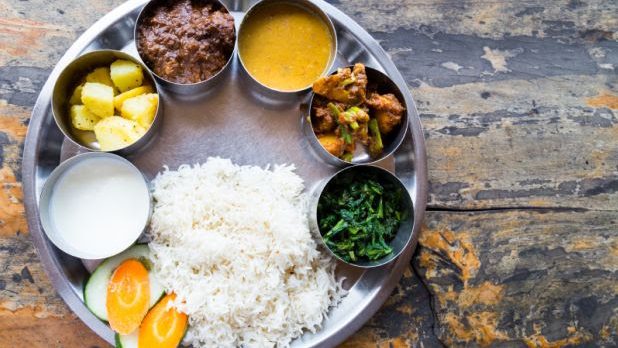Liturgy: “A Diet We Can Live With”
How might you prepare today to live forever in the culture of the Kingdom of God?

What is the King’s Liturgy? King’s Liturgy defines our experience together as a Christian community. It outlines the rhythms we celebrate with the Church at large: Scripture readings, Sabbath habits, and celebration of Holy Days and historical events.
This Week’s Lectionary Readings
Exodus 20:1-4, 7-9, 12-20
Psalm 19
Philippians 3:4b-14
Matthew 21:33-46
This week’s liturgy is contributed by Jennifer Tharp, assistant dean of student academic services:
The law of the Lord is perfect,
reviving the soul;
the testimony of the Lord is sure,
making wise the simple;
the precepts of the Lord are right,
rejoicing the heart;
the commandment of the Lord is pure,
enlightening the eyes;
the fear of the Lord is clean,
enduring forever;
the rules of the Lord are true,
and righteous altogether.
As I read and re-read the passage above from Psalm 19 (vs. 7-9), I became intrigued by the second-lines that describe the law of the Lord, etc. If someone offered me something that they said would revive the soul, make one wise, rejoice the heart, enlighten, and also be unending and righteous, I would certainly ask them to tell to me more please.
Here David seems to describe what I might summarize as the way God gave his people to live. And I haven’t taken Principles of Cultural Interpretation, but it seems like a culture, with boundaries, values and narratives. David seems to be celebrating this good way God gave us to live—including the boundaries and commandments, the limits.
It’s curious to me that David’s joy in this way of living resonates with me, yet I don’t often celebrate the boundaries or the rules or the narratives that seem to take too long in the making. I don’t feel too inclined to revel in God’s standards or the principles he gave us to guide daily life. I prefer my recipe for good living—my way that may look a lot like his way on the outside, but quietly cuts corners (e.g. forgoing rest, not reading Scripture, letting my life lack prayer, etc.) and results in inner sloppiness or sin.
I feel challenged. God has designed for us a good way to live; yet I continue to be inclined to do it my own way.
And the problem is: when I choose my own way, I’m ignoring the gifts of God. His instructions and guidelines and testimonies are gifts. How would we otherwise know how to cultivate a life he can inhabit through Jesus and the Spirit?
Speaking of recipes, food provides perhaps a helpful illustration of what I mean. Too much food, or too little, can harm the body. Certain kinds of food are better for the body than others. And there’s a cadence to eating food at multiple times throughout the day that’s strangely typical among humans, despite all the nuanced ways we live our lives these days. Within the bounds of those good-for-us foods in good measure, there is a lot to explore, and we’re free to enjoy foods even more when we’re generally eating within these principles, when we haven’t caused ourselves discomfort or, at worst, suffering.
In my experience God’s ways are similar for our lives. His ways are good for us. They provide boundaries and standards that are good for us and to us. And his good ways also give us joys to explore and pursue and in which to rest. In fact I think we’re freer to relish in those joys—not least the joy of knowing him—when we’re living within those good ways.
Today I invite you to join me in letting our own ways fall away. Even if just as an experiment for a day or a week or an hour, consider what of your own ways you could let go of in order to participate in the good way God has given us. How might you free yourself up to experience the blessing of life with God? What boundaries might you honor? In what commandments might you find the safety and comfort of compliance? What new kind of health might you choose? In what ideals and truths of the Gospel might you let your heart rejoice?
How might you prepare today to live forever in the culture of the Kingdom of God?




